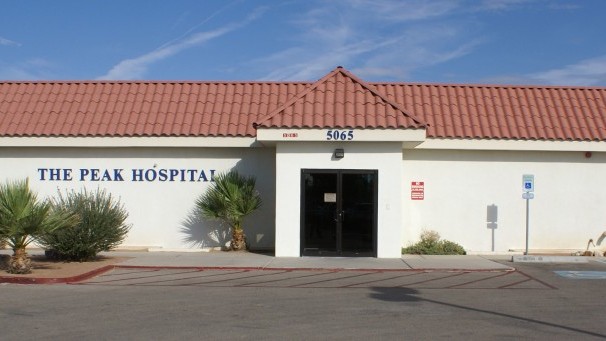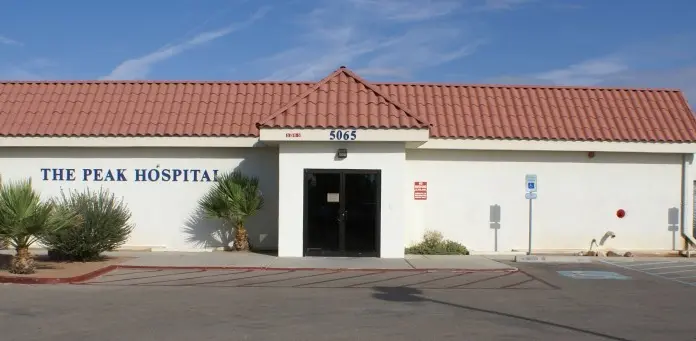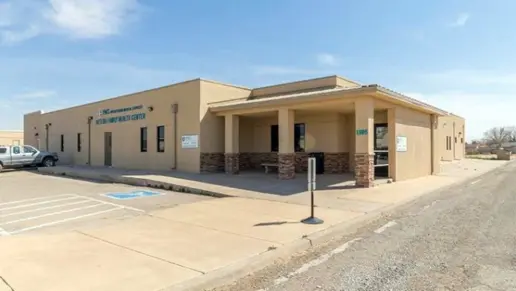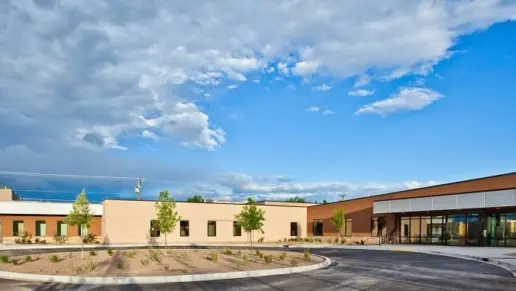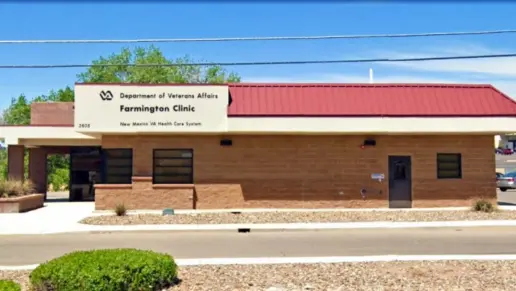Horrible place and rude staff, they never answer the calls. This place is always dirty.
About Peak Behavioral Health
Peak Behavioral Health Services is located on McNutt Road in Santa Teresa, New Mexico. As a behavioral health center, they treat adolescents, adults and seniors. They treat substance use disorder as well as co-occurring disorders (dual diagnosis).
The facility accepts most major insurance plans. They also accept Medicaid and Medicare. If you have concerns about payment or an inability to pay, contact them about other options. They’ll work with you to find a payment solution that works for you.
They offer different levels of care, including inpatient and outpatient programs. The inpatient program has tracks for adolescents ages 12-17 who are dealing with substance use and dual diagnosis issues.
Adolescents take part in group, family and individual therapy. They also have recreational therapy. They work on a discharge plan as early as the first day of admittance. They’ll also have medication management if appropriate.
The inpatient program for adults is for short term, intensive care for women and men over 18 who are in a mental health or substance use crisis. You’ll get 24/7 care with psychiatrists, medical doctors, nurses and therapists. There’s medication assisted detox and medication management after detox. You’ll also take part in individual and group therapy, substance use education and other supportive services.
The center has a partial hospitalization program (PHP) and an intensive outpatient program (IOP). The PHP works as a step down or step up program depending on your situation. If you’ve been an inpatient and need a structured environment before moving into an outpatient program or going home, the PHP is a good option. If you need a little more than an outpatient program but don’t need an inpatient program, the PHP may also be a good choice for you.
All of the programs use evidence based therapies and trauma informed care. You’ll work to get to the root of your substance abuse or mental illness so you can take an informed approach moving forward.
 Payment Options
Payment Options
Private insurance
Self-pay options
Financial aid
Medicare
Military insurance
Medicaid
 Levels of Care
Levels of Care
 Outpatient
Outpatient
Clients enrolled in outpatient rehab programs may receive daily, biweekly, or weekly treatment while continuing to live at home. This enables clients to integrate their recovery care plan into their routine work and family schedule. Addiction counseling, recovery-focused life skills training, and medication assisted treatment (MAT) are the most common services offered at outpatient centers, but many also provide holistic therapies, such as meditation and massage, and ancillary services, such as career coaching.
 Inpatient
Inpatient
Residential treatment programs are those that offer housing and meals in addition to substance abuse treatment. Rehab facilities that offer residential treatment allow patients to focus solely on recovery, in an environment totally separate from their lives. Some rehab centers specialize in short-term residential treatment (a few days to a week or two), while others solely provide treatment on a long-term basis (several weeks to months). Some offer both, and tailor treatment to the patient's individual requirements.
 Intensive Outpatient
Intensive Outpatient
Intensive outpatient programs (IOP) provide robust support for clients who choose to remain in their own homes or who are reintegrating into their community following inpatient care. IOP treatment generally consists of a combination of individual, group, and family counseling, recovery-focused life skills training, and evidence-based holistic therapies. Many intensive outpatient rehabs also offer medication assisted treatment (MAT) for clients in alcohol and/or opioid recovery. Clients in IOP typically receive nine to 20 hours of treatment weekly.
 Aftercare
Aftercare
Rehab aftercare programs promote clients' long-term recovery by providing a robust continuum of care aligned with clients' evolving needs. Because addiction is a chronic disease prone to relapse, rehab aftercare services are highly client-focused and uniquely responsive to clients' changing medical, mental health, and social circumstances. Case managers and care teams collaborate with clients, assess their goals and needs, and provide access to recovery-focused resources, such as peer coaching, employment assistance, and relapse prevention services.
 12-Step
12-Step
12 step programs promote comprehensive and continuing care for persons in recovery through peer support and personal growth. Regular attendance at 12 step meetings is required. Participants also select a peer sponsor who mentors sponsees through the recovery journey. Though the 12 steps of recovery are rooted in the belief in a higher power, religious affiliation is not mandatory. These programs are designed to facilitate self-understanding and forgiveness, personal accountability, and acceptance of that which cannot be changed.
 Sober Living Homes
Sober Living Homes
Sober living homes in New Mexico is a peer-managed residence designed for individuals who want to maintain sobriety. To achieve this goal, the setting offers recovery groups, household participation, and required sobriety. Residents rent a room and share living space with others in recovery. Individuals can live in the men's or women's sober living home indefinitely, if they continue to live in accordance with the house rules. Most stay at least six months.
 Partial Hospitalization Program
Partial Hospitalization Program
Often known as "day treatment, a partial hospitalization program (PHP) offers short-term, intensive rehab during the day, allowing you to return home in the evening. PHP treatment is often part of a step-down service provided in the treatment of substance use disorders. PHP treatment provides structured programming that includes daily therapeutic services. Typically, PHP treatment sessions are 5 days a week for approximately 6-8 hours, offering intensive treatment during the day, allowing you to return home. The duration of PHP treatment varies based on your needs but averages 90 days.
 24-Hour Clinical Care
24-Hour Clinical Care
Medical detox is offered under 24-hour clinical care in New Mexico. This setting includes a team of professionals who can address your physical, emotional, and mental health needs 24/7. Doctors often prescribe medications to relieve withdrawal symptoms and make the process safer and more comfortable. This level of care continues until you have completed detox and are medically cleared to move on to outpatient or inpatient rehab.
 Medically Assisted Detox
Medically Assisted Detox
When your body is purged of all addictive substances, the process is known as detoxification, and this is typically the first step in the addiction recovery process. A medically assisted detox is generally performed in an inpatient setting, where you are monitored by a team of medical professionals who consistently check and recheck your vital signs and provide medications if necessary to help alleviate any withdrawal symptoms. After you've safely cleared drugs and alcohol from your system, you'll likely transition to an inpatient addiction treatment program for the next phase of your recovery.
 Programs
Programs
 Adolescence program
Adolescence program
 Adult program
Adult program
 Young adult program
Young adult program
 Children program
Children program
 Elderly program
Elderly program
 Hearing impaired program
Hearing impaired program
 HIV/AIDS program
HIV/AIDS program
 LGBTQ program
LGBTQ program
 Military program
Military program
 Settings & Amenities
Settings & Amenities
-
Private transportation
-
Recreation room
-
Art activities
-
Residential setting
-
Private rooms
 Treatment
Treatment
 Dual Diagnosis
Dual Diagnosis
Many of those suffering from addiction also suffer from mental or emotional illnesses like schizophrenia, bipolar disorder, depression, or anxiety disorders. Rehab and other substance abuse facilities treating those with a dual diagnosis or co-occurring disorder administer psychiatric treatment to address the person's mental health issue in addition to drug and alcohol rehabilitation.
 Mental Health
Mental Health
Mental health rehabs focus on helping individuals recover from mental illnesses like bipolar disorder, clinical depression, anxiety disorders, schizophrenia, and more. Mental health professionals at these facilities are trained to understand and treat mental health issues, both in individual and group settings.
 Clinical Services
Clinical Services
 Cognitive Behavioral Therapy
Cognitive Behavioral Therapy
Cognitive Behavioral Therapy (CBT) is a therapy modality that focuses on the relationship between one's thoughts, feelings, and behaviors. It is used to establish and allow for healthy responses to thoughts and feelings (instead of unhealthy responses, like using drugs or alcohol). CBT has been proven effective for recovering addicts of all kinds, and is used to strengthen a patient's own self-awareness and ability to self-regulate. CBT allows individuals to monitor their own emotional state, become more adept at communicating with others, and manage stress without needing to engage in substance abuse.
 Dialectical Behavior Therapy
Dialectical Behavior Therapy
Dialectical Behavior Therapy (DBT) is a modified form of Cognitive Behavioral Therapy (CBT), a treatment designed to help people understand and ultimately affect the relationship between their thoughts, feelings, and behaviors. DBT is often used for individuals who struggle with self-harm behaviors, such as self-mutilation (cutting) and suicidal thoughts, urges, or attempts. It has been proven clinically effective for those who struggle with out-of-control emotions and mental health illnesses like Borderline Personality Disorder.
 Group Therapy
Group Therapy
Group therapy is any therapeutic work that happens in a group (not one-on-one). There are a number of different group therapy modalities, including support groups, experiential therapy, psycho-education, and more. Group therapy involves treatment as well as processing interaction between group members.
 Individual Therapy
Individual Therapy
In individual therapy, a patient meets one-on-one with a trained psychologist or counselor. Therapy is a pivotal part of effective substance abuse treatment, as it often covers root causes of addiction, including challenges faced by the patient in their social, family, and work/school life.
 Motivational Interviewing
Motivational Interviewing
Motivational interviewing can help you resolve indecisive feelings and develop the confidence to make changes. It is a short term counseling method that offers empathy and practical support and is often used as part of drug and alcohol rehab in New Mexico.
 Trauma Therapy
Trauma Therapy
Trauma therapy addresses traumatic incidents from a client's past that are likely affecting their present-day experience. Trauma is often one of the primary triggers and potential causes of addiction, and can stem from child sexual abuse, domestic violence, having a parent with a mental illness, losing one or both parents at a young age, teenage or adult sexual assault, or any number of other factors. The purpose of trauma therapy is to allow a patient to process trauma and move through and past it, with the help of trained and compassionate mental health professionals.
 Couples Therapy
Couples Therapy
Whether a marriage or other committed relationship, an intimate partnership is one of the most important aspects of a person's life. Drug and alcohol addiction affects both members of a couple in deep and meaningful ways, as does rehab and recovery. Couples therapy and other couples-focused treatment programs are significant parts of exploring triggers of addiction, as well as learning how to build healthy patterns to support ongoing sobriety.
 Family Therapy
Family Therapy
Research clearly demonstrates that recovery is far more successful and sustainable when loved ones like family members participate in rehab and substance abuse treatment. Genetic factors may be at play when it comes to drug and alcohol addiction, as well as mental health issues. Family dynamics often play a critical role in addiction triggers, and if properly educated, family members can be a strong source of support when it comes to rehabilitation.
 Life Skills
Life Skills
Substance use disorders disrupt thinking and behavior patterns, which interferes with critical life skills. Drug rehab programs in New Mexico include life skills training to allow you to rebuild those skills. You'll relearn how to think, behave, and interact with others in healthy ways so you can successfully navigate daily life.
 Recreational Therapy
Recreational Therapy
Through recreational therapy, you engage in activities that support your mental and physical health, as well as promote your addiction recovery. The activities might include team sports, creative arts, or yogurt to help manage your stress, improve your mood, and build a supportive network of individuals who help you maintain your long term sobriety.
 Creative Arts Therapy
Creative Arts Therapy
Creative arts therapy gives you the opportunity to express yourself in ways beyond words. Your therapist will help you use creative activities to explore emotions and process difficult situations.
 Nicotine Replacement Therapy
Nicotine Replacement Therapy
Often, cravings and withdrawal symptoms stop people from giving up tobacco. Nicotine replacement therapy in New Mexico helps with these symptoms, so the process is more comfortable. To quit smoking, you may want to consider these therapies, which include medications, inhalers, sprays, patches, and gum.
 Accreditations
Accreditations

LegitScript Certified
LegitScript has reviewed Peak Behavioral Health as part of their certification program, and has determined that it meets the LegitScript standards for legality, safety and transparency.
LegitScript verified in June 2024

State License
State Licenses are permits issued by government agencies that allow rehab organizations to conduct business legally within a certain geographical area. Typically, the kind of program a rehab facility offers, along with its physical location, determines which licenses are required to operate legally.
State License: New Mexico

Joint Commission
The Joint Commission, formerly known as JCAHO, is a nonprofit organization that accredits rehab organizations and programs. Founded in 1951, the Joint Commision's mission is to improve the quality of patient care and demonstrating the quality of patient care.
Joint Commission Accreditation: Yes
